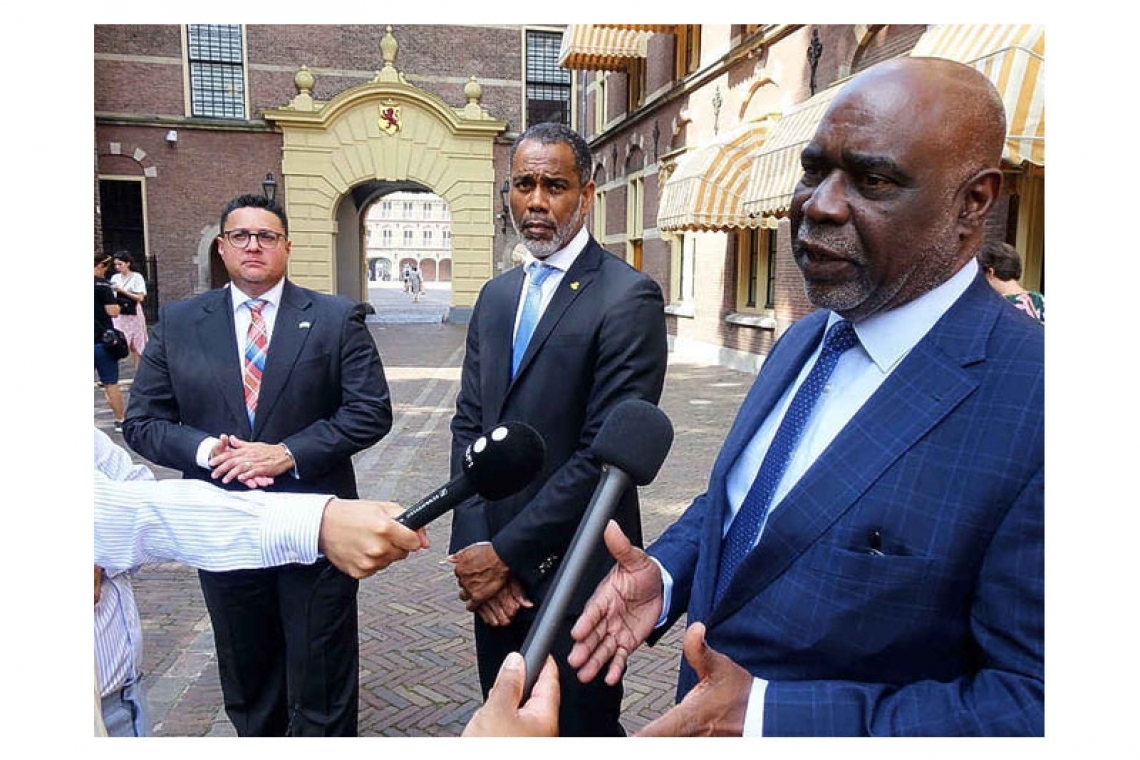The three plenipotentiary ministers being interviewed after Friday’s meeting of the Kingdom Council of Ministers. From left: Guillfred Besaril of Aruba, Rene Violenus of St. Maarten and Raymond Begina of Curaçao. (Suzanne Koelega )
THE HAGUE--The Kingdom Council of Ministers on Friday didn’t yield any concrete agreements. Nevertheless, the plenipotentiary ministers of Aruba, Curaçao and St. Maarten were positive about the outcome and remained cautiously optimistic about the negotiations with the Dutch government.
“There was room for dialogue,” said St. Maarten Minister Plenipotentiary Rene Violenus after the meeting in The Hague. Unfortunately, the counterproposal of the St. Maarten government to the Dutch demand for the establishment of a Caribbean Reform Entity in the form of a Kingdom Law received no support in the Kingdom Council of Ministers.
The St. Maarten counterproposal gives Aruba, Curaçao and St. Maarten a larger role and say in the Caribbean Reform Entity, with a greater comprehension for the local circumstances of the countries and the possibility for differentiation between them.
“We were heard. Our proposal did not carry, but the room to continue the dialogue exists to come to some sort of understanding with the Ministry of Home Affairs and Kingdom Relations BZK,” said Violenus.
According to Violenus, the Netherlands was not deviating “very much” from the package that it presented a few days before the July 10 Kingdom Council of Ministers meeting. “But we will do what we can to get them to see our standpoint, and hopefully eventually we can reach a consensus as a Kingdom.”
Violenus said he was “hopeful” about reaching a consensus before the next Kingdom Council of Ministers on September 11. “It is about getting the Netherlands to understand that there are elements in the package, in the proposed Kingdom Law that are unconstitutional and that conflict with our autonomy and our ways of working. We want to continue talking and see whether we can find common ground.”
Aruba Minister Plenipotentiary Guillfred Besaril said it was a good meeting. “We managed to keep the dialogue going. Keeping the channels open is essential for the negotiations.” He said that he reiterated during Friday’s meeting that Aruba’s position is different from Curaçao and St. Maarten.
Aruba is much farther in the negotiations and closer to reach an agreement with the Netherlands. “It is just as in a family: you have different children whom you cannot all treat the same,” said Besaril.
According to Besaril, Finance Minister Wopke Hoekstra and State Secretary of Home Affairs and Kingdom Relations Raymond Knops have the mandate that they can sign off on disbursing the third tranche to Aruba in case an agreement is reached before the September 11 meeting.
Curaçao Minister Plenipotentiary Raymond Begina agreed that it was a positive meeting. “There is room to continue the negotiations in a constructive manner, from both sides.” He said that there was comprehension for the points of the Curaçao government. “My feeling is that it went well. Now we need to use the time well to reach an agreement before the next Kingdom Council of Ministers meeting on September 11.”
State Secretary Knops didn’t use the words hopeful or optimistic after Friday’s meeting. “We are talking. Today we concluded that St. Maarten has not met the requirements for the second tranche. Curaçao is close to fully complying and was given an extension until September 1.” Aruba had already met all conditions for the second tranche liquidity support several weeks ago.
Asked about the status of the negotiations, Knops said that frequent talks have been taking place in the past weeks with all three countries and that these would continue. “But the package of July 10 will remain the point of departure in these talks.” He said that the counterproposal by St. Maarten regarding the Caribbean Reform Entity was “so far off” from the Dutch proposal that it was put aside.
The state secretary said that as the country providing the loans to help Aruba, Curaçao and St. Maarten through this crisis, the Netherlands had the right to be strict. “We give the loans, and that means that there must be supervision. We are talking about a prolonged period and a lot of money.”
Knops said that the package didn’t only contain cost-cutting measures and increased supervision, but also much-needed investments in the islands’ economies, their law enforcement, public health and educational system. The packages are in the interest of the residents of the islands, he emphasised.
The state secretary didn’t want to speculate on the outcome of the negotiations. “We will continue talking. I assume that the talks will eventually lead to results, but when and in what form, I can’t say. I am a bit cautious to anticipate on a result.”







